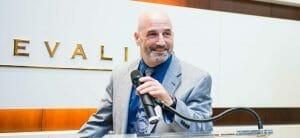Recognizing an increased student interest in the field of criminal law, Atlanta’s John Marshall Law School launched the Criminal Justice Certificate Program (CJCP) in 2018. From 2011-2018, the Law School offered the program as the Criminal Justice Honors Program.

Students may decide to pursue the Criminal Justice Certificate upon completion of their second year (after having the benefit of taking Criminal Law and Criminal Procedure: Investigation).
Students working towards the Criminal Justice Certificate would take the remainder of the required coursework during their 3L year along with a mandatory Criminal Justice Workshop. Interested students could also begin fulfilling their 300 hours of approved field work requirement during the summer between their 2L and 3L year.
This modification will allow students who are inspired in their first two years to pursue careers in criminal justice and to benefit from this unique program. Atlanta’s John Marshall Law School is excited about this step in the evolution of this cutting-edge program.
Practical Curriculum
The Criminal Justice Certificate Program curriculum prepares graduates to practice criminal law, whether as a prosecutor or a defender. Core components of the program approach include:
- Integration – Students appreciate how all of the courses in the criminal law curriculum relate to one another and to the larger practice of law;
- Application – Students not only understand these lessons in theory, but learn how to apply these lessons to situations they will encounter in their practice;
- Reality Based – Students not only learn the ideals that underscore any criminal law curriculum, but also understand how the criminal justice system works in reality.

Students graduate equipped with strategies to allow them to shape the criminal justice arena rather than simply being shaped by it. The Criminal Justice Certificate Program provides an integrated, applied approach to legal education that equips our students with the necessary strategies to be ethical, professional, and moral lawyers in less than perfect systems.
To earn the Criminal Justice Certificate, students must complete the following courses. Those with an asterisk are electives. The others are requirements necessary to complete the J.D. Program.
Criminal Law
Criminal Procedure: Investigation
Evidence
Criminal Procedure: Adjudication*
Criminal Justice Lawyering*
Criminal Pretrial Advocacy*
Criminal Trial Advocacy*
Expert Faculty

Atlanta’s John Marshall Law School is particularly qualified to offer this intensive and practical criminal law certificate. It boasts a faculty of experts in the practice of criminal law, with a combined total of over 75 years of practical experience in the field. Our faculty members are well-connected to the criminal justice community both locally and nationally. Our low student-to-faculty ratio allows for our students to be mentored by their professors.
Real-World Experience

Students enrolled in the Criminal Justice Certificate Program will complete 300 hours of approved field work during their tenure as law students. This may include field work related to paid employment, internships, or externships, as long as it is criminal justice related. Students will also participate in a workshop during their final year, where they will be afforded the opportunity to apply curriculum lessons in a criminal law placement. Our location in the heart of Atlanta provides access to a wide variety of criminal law related externship opportunities. Atlanta’s John Marshall Law School has established and approved externship placements with many criminal courts, juvenile law and advocacy agencies, public defenders offices, prosecutors offices, and municipal and state agencies.
How to Participate in the Criminal Justice Certificate Program
The CJCP brings together students passionate about criminal justice who are eager to learn from and share with one another as the class embarks on a collective learning experience. We want students with an array of experiences, perspectives, and ideas.
-
- Students will not need to decide whether to work towards the Criminal Justice Certificate until after they have completed Criminal Procedure: Investigation. For full-time students this will be after your spring semester of your second year.
- Part-time students may earn the Criminal Justice Certificate, however, not all program requirements will be offered during the evening.
- To earn the Criminal Justice Certificate, students must complete all required courses, complete 300 hours of criminal justice related field work during their law school career, participate in the Criminal Justice Certificate Workshop during their final two semesters of law school, and graduate in good standing.
- Students who wish to earn the Certificate must notify Professor Rapping of their intent, in writing, upon completion of Criminal Procedure: Investigation. If at any point, a student working towards the Certificate elects to no longer pursue the Certificate, they must notify Professor Rapping, in writing, at the point that they make that decision.
Questions?
Connect with Professor Jonathan Rapping, jrapping@johnmarshall.edu or (678) 916-2642.
